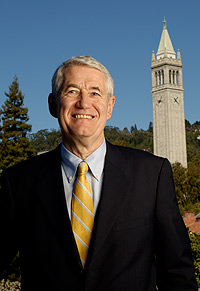Berkeleyan
Chancellor Birgeneau honored with Academic Leadership Award
Carnegie Corporation recognizes ‘leading spokesman’ for higher ed
![]()
| 17 July 2008
 Robert Birgeneau (John Blaustein photo) |
The awards, one of which went to Syracuse University Chancellor and President Nancy Cantor, were announced last month by Vartan Gregorian, president of Carnegie Corporation of New York. “With intellectual ferocity, creativity, and sheer will, Robert Birgeneau and Nancy Cantor have created for their students an even deeper, more engaging academic experience aimed not just at sustaining America’s world-class system of higher education, but transforming it to equip students for success in a global knowledge economy,” said Gregorian.
The Carnegie Corporation Academic Leadership Award annually celebrates outstanding individuals whose uncompromising commitment to academic excellence and bold, visionary leadership are establishing new standards for U.S. higher education.
Statement of the Carnegie Corporation on the presentation of its Academic Leadership Award to Chancellor Robert J. Birgeneau Robert J. Birgeneau, Chancellor of the University of California, Berkeley, an internationally distinguished physicist, is well known for his commitment to student and faculty diversity and equity in the academic community. Starting with a landmark study he commissioned when dean of sciences at MIT, he has been a nationally prominent advocate for improving opportunities for women faculty in the sciences. At UC Berkeley, he has introduced important initiatives to focus on international challenges such as global poverty, climate change, and multi-cultural societies and has built strong links with the surrounding community. Birgeneau has emerged as a leading spokesman for public higher education and the importance of ensuring America’s young people have access to the best education available. He is a champion for maintaining affordability — particularly to families of limited means — noting that public universities, which educate the majority of the nation’s undergraduates, lack the substantial endowments and other financial resources available to private institutions. In a related effort, Chancellor Birgeneau has advocated on behalf of undocumented students who have completed secondary education in U.S. schools but are barred from receiving the financial aid necessary to continue their education. In a testament to his efforts to equip public universities to compete effectively with private institutions, the university received the largest grant in its history: the $110 million Hewlett Foundation Challenge, designed to ensure the development and retention of top-level faculty by endowing eighty chairs and twenty “distinguished” chairs spanning multiple academic areas. In addition, Chancellor Birgeneau has helped to develop and expand several strategic programs aimed at students from challenging backgrounds, including the incentive awards program, which provides a full scholarship as well as support services to low-income students who have demonstrated leadership potential and academic excellence. Other initiatives Chancellor Birgeneau has spearheaded include Cal Prep, a new charter school collaborative between the Berkeley campus and Aspire public schools, designed to immerse students in a culture of high academic expectations, improve their preparation for college and develop a model teaching curricula for college readiness. |
“This is a great honor that I proudly share with my colleagues at UC Berkeley,” said Birgeneau. “To be recognized by the Carnegie Corporation for the hard work that we have undertaken to guarantee that Berkeley can continue to serve all the people of California as we reach out to the world in research and public service is fantastic. I am particularly pleased to share this award with President Cantor, whom I have long admired as a great leader in higher education, both public and private.”
Birgeneau said that he would immediately allocate $50,000 of the award to seed an endowment to assist Berkeley students who are former foster children, because “they face unique and substantial financial challenges.”
“Recognizing that higher education is for many families the gateway to the American Dream — the principal means of achieving social mobility — Birgeneau and Cantor have each implemented programs in their respective communities to improve college readiness,” Gregorian said. He added that this year’s winners continue to advocate for increased access to quality higher education regardless of socioeconomic status.
The award recognizes leaders of institutions of higher education who have an abiding commitment to liberal arts and who have initiated and supported curricular innovations, including development of interdisciplinary and multidisciplinary programs that aim to bridge the gulf between the theoretical and the practical, according to the Carnegie Corporation.
It said the award, established in 2005, is also an investment in leadership that builds on the foundation’s long tradition of developing and recognizing leadership in higher education.
Carnegie Corporation of New York was founded by Andrew Carnegie in 1911 to promote “the advancement and diffusion of knowledge and understanding.” The award for academic leadership renews and continues a Carnegie Corporation higher-education tradition. The selection process is initiated by the corporation and does not depend on external nominators or recommendations.

